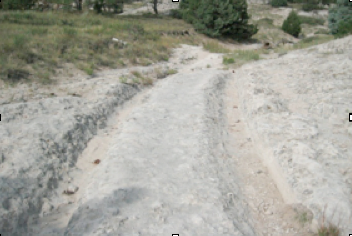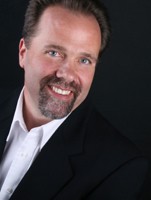Sign In


LOG IN
Caution: Road work ahead (Part 2)
Don't let fear of failure hold you back


Are you on the road or in a rut? In Part I of Caution: Road work ahead, I talked about looking for the road less traveled. In this follow-up, I'm interested in a more active approach to destination management.
As I thought more about the road signs I was seeing, I thought perhaps another message being delivered is a challenge to forge my own path—to create my own road. Blaze a trail! While that sounds exciting, it also sounds much more difficult.
 This photo (at right) shows the wheel marks that were worn into the bedrock along the California/Oregon Trail in Wyoming. You can still see them today. It isn't hard to guess who had an easier time finding the way to Oregon. Once the first thousand wagons crossed the prairie, all you had to do was get your wagon wheels in the well-worn track, snap the whip over your oxen, and pray you had good weather, plenty of food, and minimal contact with the indigenous folks.
This photo (at right) shows the wheel marks that were worn into the bedrock along the California/Oregon Trail in Wyoming. You can still see them today. It isn't hard to guess who had an easier time finding the way to Oregon. Once the first thousand wagons crossed the prairie, all you had to do was get your wagon wheels in the well-worn track, snap the whip over your oxen, and pray you had good weather, plenty of food, and minimal contact with the indigenous folks.
But getting your wagon wheels out of that well-worn rut to forge a different path took a lot of energy, courage, persistence, and—most of all—vision. It was this willingness to take alternative routes that populated a continent. For those willing to be first, there was huge potential for reward, with an equally daunting risk of failure (which, in those days, was often associated with death).
Thankfully, in contemporary civil society, there are few business risks that upon failure result in death. If death is the worst-case scenario of any risk and the risk of death has been effectively removed by the safeguards put in place by our families, communities, governments, trade organizations, and rule of law, then why are we so risk averse as individuals? If the greatest rewards are bestowed upon those who take the greatest risk and then succeed, then why don't more people step outside of conventional wisdom or the status quo and venture beyond the safety net of mediocrity?
The answer to that question is well-documented by many, and probably most easily accessible via Seth Godin's book Linchpin, wherein he describes a highly paranoid, shivering, and fearfully wide-eyed lizard-like creature that lives deep inside our brains in a well-protected little house called the amygdala. Just Google “lizard brain amygdala" and you'll have plenty to study.
For those of you more interested in a quick fix without studying the vagaries of the lizard brain, here's a call to action that is one of my mother's favorite aphorisms (and I wish I had a dollar for every time she said it): What doesn't kill you makes you stronger. Here's another gem: Adversity builds character.
I like it. I'm ready to build a road to take me exactly where I want to go, rather than waiting for someone else to build it or someone else to harvest the low hanging fruit along the way. It's about getting over our fears and being willing to step outside our comfort zones, and yes, being willing to sacrifice our status quo to enable us as individuals and as a country to pull the wagon wheels up out of the deeply-worn rut we are in and construct the road that will enable us to achieve our full potential.
We've got to be willing to risk it all to get where we want to go.
 Chris Hardy is a Broker Associate for Coldwell Banker Residential Brokerage in Fort Collins, Colorado. In 2011 he was named Realtor of the Year by the Fort Collins Board of Realtors.
Chris Hardy is a Broker Associate for Coldwell Banker Residential Brokerage in Fort Collins, Colorado. In 2011 he was named Realtor of the Year by the Fort Collins Board of Realtors.
You can send your feedback to Chris at chris.hardy@coloradohomes.com, and you can visit his website by logging on to www.chrishardyrealtor.com.

